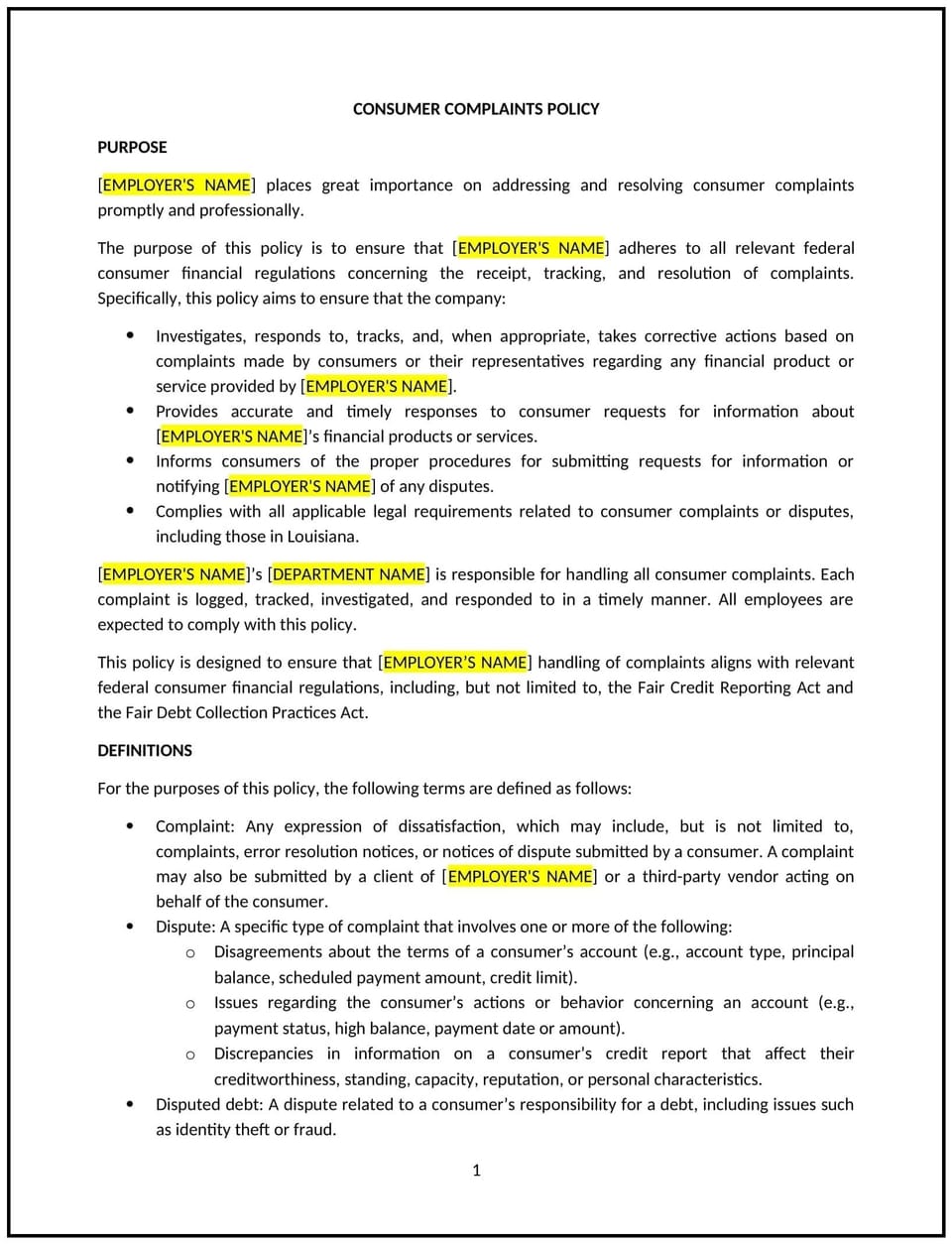Consumer complaints policy (Louisiana): Free template

Consumer complaints policy (Louisiana)
This consumer complaints policy is designed to help Louisiana businesses establish clear procedures for handling and resolving customer complaints. It outlines the steps for receiving, documenting, and addressing concerns, fostering trust and satisfaction among customers.
By implementing this policy, businesses can enhance customer relationships, reduce reputational risks, and improve operational practices.
How to use this consumer complaints policy (Louisiana)
- Define a complaint: Clearly explain what constitutes a consumer complaint, such as dissatisfaction with products, services, or customer interactions.
- Establish reporting channels: Provide customers with accessible ways to submit complaints, such as email, phone, online forms, or in-person.
- Set documentation guidelines: Outline procedures for recording complaints, including key details like the nature of the complaint and the resolution timeline.
- Define resolution processes: Detail how complaints will be reviewed, investigated, and addressed promptly and fairly.
- Include escalation procedures: Specify how unresolved complaints can be escalated to higher management or external dispute resolution.
- Monitor feedback trends: Regularly analyze complaints to identify recurring issues and areas for improvement.
Benefits of using a consumer complaints policy (Louisiana)
Implementing this policy provides several advantages for Louisiana businesses:
- Builds customer trust: Demonstrates a commitment to addressing concerns professionally and effectively.
- Enhances operational efficiency: Helps identify and resolve systemic issues affecting customer satisfaction.
- Reduces reputational risks: Establishes a structured approach to managing and resolving complaints before they escalate.
- Promotes fairness: Ensures all customer concerns are treated consistently and impartially.
- Aligns with Louisiana-specific considerations: Reflects regional practices and cultural norms for handling customer concerns.
Tips for using this consumer complaints policy (Louisiana)
- Communicate reporting channels: Ensure customers know how and where to submit complaints.
- Train employees: Equip staff with the skills to handle complaints professionally and empathetically.
- Track complaints systematically: Use a centralized system to record and monitor complaints for accountability and trend analysis.
- Focus on timely resolution: Aim to address complaints promptly to maintain customer trust.
- Review and improve: Regularly assess the policy and complaint trends to identify areas for business improvement.
Q: What qualifies as a consumer complaint under this policy?
A: A consumer complaint includes any dissatisfaction expressed by a customer regarding products, services, or customer interactions that require resolution.
Q: How should businesses handle complaints received through multiple channels?
A: Businesses should consolidate complaints into a central system to ensure consistent tracking and resolution regardless of the channel used.
Q: What is the recommended timeframe for resolving customer complaints?
A: Businesses should aim to resolve complaints promptly, typically within a timeframe specified in the policy, such as 5-7 business days.
Q: How can businesses track consumer complaints effectively?
A: Businesses can use complaint management software or maintain detailed logs to document the nature of complaints, actions taken, and resolutions.
Q: What steps should businesses take for unresolved complaints?
A: Unresolved complaints should be escalated to higher management or an external dispute resolution process, as outlined in the policy.
Q: How often should this policy be reviewed?
A: The policy should be reviewed annually or whenever there are changes in Louisiana regulations or business practices affecting complaint management.
Q: How can businesses use complaint data for improvement?
A: Businesses can analyze complaint trends to identify recurring issues, improve processes, and enhance customer satisfaction.
This article contains general legal information and does not contain legal advice. Cobrief is not a law firm or a substitute for an attorney or law firm. The law is complex and changes often. For legal advice, please ask a lawyer.


